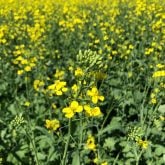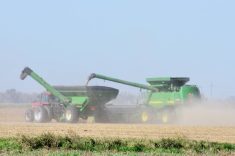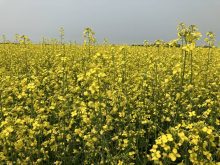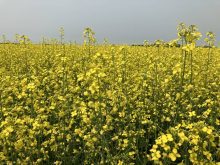Manitoba potato growers, forced to leave an unprecedented number of acres unharvested last fall, are worried 2019 could be a repeat.
“It’s not looking very good,” Dan Sawatzky, manager of the Keystone Potato Growers Association (KPGA) representing the province’s 52 processing potato growers said in an interview Sept. 30. “I am hoping we can dig a crop here and have potatoes in the bin to run the plants this year.
“I think the final blow will be a frost that goes some depth in the soil, but until that happens there’s always some hope.
Read Also

Thunderstorms and straight-line winds
Straight-line winds in thunderstorms can cause as much damage as a tornado and are next on our weather school list exploring how and why severe summer weather forms.
“We’re also seeing a little more rot showing up with crop sitting in saturated soil. So even if they do get the crop, storing might be a little more challenging as well.”
As of Oct. 9 Sawatzky estimated 60 to 65 per cent of Manitoba’s potatoes had been harvested.
While Manitoba’s potato acreage is small relative to grain and oilseed crops, potatoes’ high value belies their importance to Manitoba growers and the economy, producing $267 million in Manitoba farm cash receipts in 2017. Manitoba’s three potato-processing plants employ around 1,000 people.
Frequent rains in September 2018 delayed potato digging, which most years is completed by early October, Sawatzky said.
That was followed by freezing temperatures Oct. 11, 2018, which froze many unharvested potatoes. As a result, 5,200 acres of potatoes weren’t harvested.
“That’s unprecedented in the history of potatoes I guess in the last 50 years,” Sawatzky told Keystone Agricultural producers’ Nov. 12, 2018 advisory council meeting in Portage la Prairie.
The loss was made worse because yields were above average.
Moreover, most of the potatoes from 4,000 acres harvested after the frost started rotting and were dumped back on the land, Sawatzky said.
Based on an estimated gross return of $4,000 an acre those combined 9,200 acres of unharvested and unusable potatoes cost farmers around $36.8 million.
As of this summer potato growers had only received around $5 million in compensation through crop insurance.
“We ended up about 3.9 million hundredweight short of our contracted volume last year (of around 16 million hundredweight),” which, represents 24 per cent of what was contracted, Sawatzky said. “That was very significant. It amounts to a lot of dollars the grower forfeited last year.”
It also added cost for processors who had to import potatoes from Alberta and Idaho.
In addition, 900,000 hundredweight of Manitoba potatoes contracted to be exported to Simplot’s Grand Forks, N.D., plant were processed in Portage la Prairie instead.
Manitoba farmers planted around 70,000 acres of potatoes this spring, up from 64,000 in 2018. About 80 per cent are for processing and the rest for the table market.
Manitoba plants are expanding and so too are the province’s growers to increasing demand, Sawatzky said.
“It’s strong,” he said. “World demand and domestic demand has grown.”
Although Prince Edward Island, which planted 85,000 acres of potatoes in 2019, remains No. 1 in acres, Manitoba is Canada’s largest processing potato producer and has been for quite a while, Sawatzky said.
That’s partly because Manitoba potato yields are rising faster than in P.E.I., he said.
“Our yields continue to move forward,” Sawatzky said. “This year again there is a very strong crop out there. But we’ll need the weather to get it.”
Given last year’s problems KPGA wants to see improvements in Canada’s farm business risk management programs, Sawatzky said.
Crop insurance payouts in 2018 covered just a small part of potato growers’ losses, he said.
There are several reasons. Payouts are reduced when crop goes unharvested to reflect what farmers save by not harvesting.
Also, Manitoba potato yields have jumped significantly the last few years, along with production costs.
“We could consider higher levels of (insurance) coverage (currently capped at 80 per cent of the 10-year averaged yield),” he said. “P.E.I. does have a 90 per cent option so the provincial government is helping with the program there and of course the growers pay much higher premiums as well to get that. So that is something we are considering proposing.”
KPGA also asked the Manitoba government to launch an AgriRecovery payment. The province rejected the request but KPGA is appealing, arguing losses potato farmers suffered last year fit the program’s criteria because they were extraordinary, Sawatzky said.
Manitoba Agriculture Minister Ralph Eichler is not a fan of AgriRecovery, he told reporters Sept. 30 when asked if he would use it to help cattle farmers suffering from drought this summer.
“So once you open that door to AgriRecovery, it’s open,” he said. “There’s no going back. What you do for one you have to for others. It’s very, very, very difficult to find a program that would be suitable in a case like this. Then it has to become a budgetary item. How much money do you put into that program and at what cost for ratepayers?”
Farm programs are supposed to help farmers when they suffer big losses due to circumstances beyond their control, Sawatzky said.
“It’s discouraging when we aren’t able to access them,” he said.
AgriStability didn’t help potato growers last year either, Sawatzky said. Like most other farm groups KPGA wants the trigger for AgriStability payouts to occur when margins fall below 85 per cent drop, instead of the current 70 per cent.




















